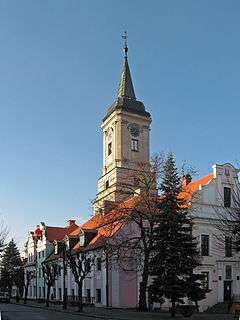Byczyna
| Byczyna | |||
|---|---|---|---|
.jpg) | |||
| |||
 Byczyna | |||
| Coordinates: 51°7′N 18°13′E / 51.117°N 18.217°E | |||
| Country |
| ||
| Voivodeship | Opole | ||
| County | Kluczbork | ||
| Gmina | Byczyna | ||
| Area | |||
| • Total | 5.79 km2 (2.24 sq mi) | ||
| Elevation | 197 m (646 ft) | ||
| Population (2006) | |||
| • Total | 3,677 | ||
| • Density | 640/km2 (1,600/sq mi) | ||
| Postal code | 46-220 | ||
| Website | http://www.byczyna.pl | ||
Byczyna [bɨˈt͡ʂɨna] (Latin: Bicina, Bicinium, German: Pitschen) is a town in Kluczbork County, Opole Voivodeship, Poland, with 3,708 inhabitants (2004).
The town of Byczyna was first mention in 1054 when it temporarily served as the capital of the Bishopric of Wrocław. After the loss of the Silesian duchies by the kingdom of Poland in the early 14th century Pitschen was for centuries a border town [1] (near the border to Poland) and located north of Kluczbork and Rosenberg in Upper Silesia. The battle (Battle of Pitschen) took place near Byczyna between Maximilian III, Archduke of Austria, who was elected as king of Poland, and Sigismund Vasa who also was elected as king, on January 24, 1588. Maximilian was defeated. He surrendered and went to imprisonment. The German author Gustav Freytag[2] reports in his memories about yearly border violations at Byczyna.
Famous persons connected to Byczyna
- Eliasz Kreczmar (von Löven), physician and astronomer, married Maria Cunitz
- Maria Cunitz (1610-1664), German astronomer, born in Wohlau (Lower Silesia), died at Pitschem
- Priest Johann Dzierzon, scientist, an autochthon Silesian, went to school at Byczyna
- Piotr Steinkeller (1799-1854), industrialist, "Polish King of Zinc" exploited local ore deposits
- Martin Wilhelm Kutta (November 3, 1867 – December 25, 1944), mathematician
- Adam Quasius (1673–1736), theologian and Deacon at St. Elisabeth Church in Breslau (now Wroclaw)
References
- ↑
- Pitzen north of Kreuzburg (in the duchy of Brieg (Ducatus Bregensis)) 1600 Silesia Map Archived 2012-07-16 at the Wayback Machine.
- ↑ Gustav Freytag in his Memories mentions border violations against Pitschen farmers
External links
Gallery
- Ramparts in Byczyna, 15th century
 "German" tower gate
"German" tower gate The Saint Nicolaus evangelic church
The Saint Nicolaus evangelic church
Coordinates: 51°07′N 18°13′E / 51.117°N 18.217°E

.svg.png)